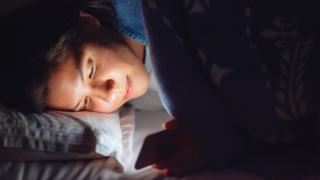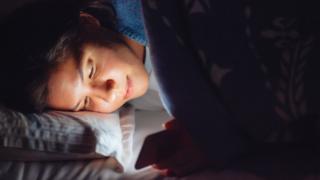Heavy social media use linked to poor sleep
Teenagers spending more than three hours on their phones are more likely to sleep badly, a study suggests. …

 Image copyright Getty Images
Image copyright Getty Images Teenagers using social media for more than three hours a day are more likely to go to bed after 23:00 and wake during the night, UK research suggests.
This affects one in three teens – with one in five spending five hours or more on apps like Instagram, WhatsApp and Facebook every day, the study said.
The University of Glasgow researchers said 13 to 15 year-olds may be delaying bedtime by being on their phones.
Psychiatrists say screens should be avoided in the hour before bed.
Body-clock changes
But the study, of 12,000 teenagers, recognised that getting them off their phones could be “especially challenging” because it was a time of growing independence, when keeping in touch with friends was important.
Teenagers who were very high social-media users (five hours or more per day) were around 70% more likely than average users (one to three hours) to fall asleep late on school nights and after midnight on other days.
The study adds weight to the theory that time spent by teenagers on social media is reducing the time they spend sleeping – and lack of sleep can have an impact on mental health, weight and performance at school.
How long do teenagers spend on social media?
| Hours per day | % of boys | % of girls | % of both |
|---|---|---|---|
| less than one hour | 43.8 | 22.8 | 33.7 |
| between one and three hours | 32.1 | 31.1 | 31.6 |
| from three to five hours | 10.4 | 17.7 | 13.9 |
| more than five hours | 13.7 | 28.4 | 20.8 |
Sleep is already in short supply at this age due to hormone changes making many teenagers want to go to sleep later and wake up later.
For the study, in BMJ Open, data was gathered from a representative sample of UK adolescents from 2015 who took part in the Millennium Cohort Study.
They were asked how much time they spent on social networking, messaging sites or apps on a typical school day and at weekends, and quizzed on their sleep habits.
One third said they used social media for less than an hour a day while the average was between one and three hours. These groups were least likely to fall asleep late.
Girls were twice as likely as boys to spend more than five hours on social media – and girls also had more disrupted sleep.
‘Don’t want to miss out’
Dr Holly Scott, from the school of psychology at Glasgow University, said the findings couldn’t prove that high social media use caused disrupted sleep, but it appeared to be a “powerful competitor for sleep”.
“Teenagers may be lying awake because they are not ready to fall asleep and then struggling to disengage from social media because they don’t want to miss out.”
However, Dr Scott said social media was an important form of social interaction and research now needed to look in more detail at why and how teenagers were using it.
Dr Bernadka Dubicka, chairwoman of the child and adolescent faculty at the Royal College of Psychiatrists, said depressed young people may “increasingly turn to social media late into the night”.
She said doctors should always ask their young patients about their use of social media when discussing sleep and mental health issues.
Dr Max Davie, from the Royal College of Paediatrics and Child Health, said good quality sleep was vital for children and young people.
“We recommend that young people stay off all screens for at least an hour before bed so their brains have time to wind down.
“Lack of sleep can have a significant negative impact not only on young people’s wellbeing, but on their relationships with family and friends and in terms of reaching their full potential at school.”

